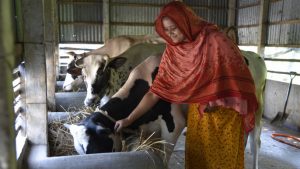“Dad says I’m buying the next tractor,” 13-year-old Zac McRae joked.
Key points:
China’s desperation for Australian infant formula is injecting new life into Victoria’s struggling dairy industry
Dairy processor ViPlus Dairy has doubled its local workforce in a year
Some South Gippsland families are investing in, and expanding, their dairy businesses
Zac is helping with the milking of 400 cows on his family’s 380-hectare farm at Middle Tarwin, one of three properties the family owns.
The past few years have been tough for most Victorian dairy farmers. They have battled low milk prices and dry conditions.
But in South Gippsland last month there was flooding, something most dairy farmers are only dreaming about at the moment.
“The future is fairly bright, really,” Jason McRae said.
“I’ve got my young fella coming along, Zac — he’s really keen, so that’s good, and Mum and Dad are still involved.”
And while the rain helps, so does a healthy market for the McRaes’ milk.
Infant milk demand injects positivity into market
China’s desperation for Australian infant formula is injecting new life into the industry.
At Korumburra, a processing plant dries milk and turns it into powder; much of it will help to satisfy the huge demand.
“This is not a bubble, this is real, this is sustainable,” said Burra Foods chief executive Grant Crothers.
“You’ve now got the biggest dairy company in mainland China making a $1.5 billion investment in infant formula that comes from Australia.”
He is talking about Chinese company Mengniu bidding to take over Australian infant formula company Bellamy’s Organic.
Adding to the local flavour, the vitamins and additives that turn this powder into formula are added at Toora, less than an hour down the road.
Processor doubles workforce in a year
ViPlus Dairy has doubled its local workforce in a year — 120 people help produce 30,000 tins of formula and 40,000 bags of milk powder a day.
“The demand has increased three-fold over the last couple of years,” said ViPlus sales and marketing manager Chris McKiernan.
But getting Australian infant formula into Chinese babies’ bottles is not easy; regulations that came into force in China at the start of last year mean some Australian companies can only sell their products online.
“There are certainly a lot of regulatory hoops to jump through,” said Dairy Australia senior industry analyst John Droppert.
“It’s no longer the case that you can get a contract, blend up some powder and put it in a container.”
With favourable conditions returning, South Gippsland has become a destination for dairy farmers forced out of drier areas.
“Farmers are mobile; it’s not an easy thing to do but they certainly will move. Gippsland is one of those regions that has relative security of water.”













